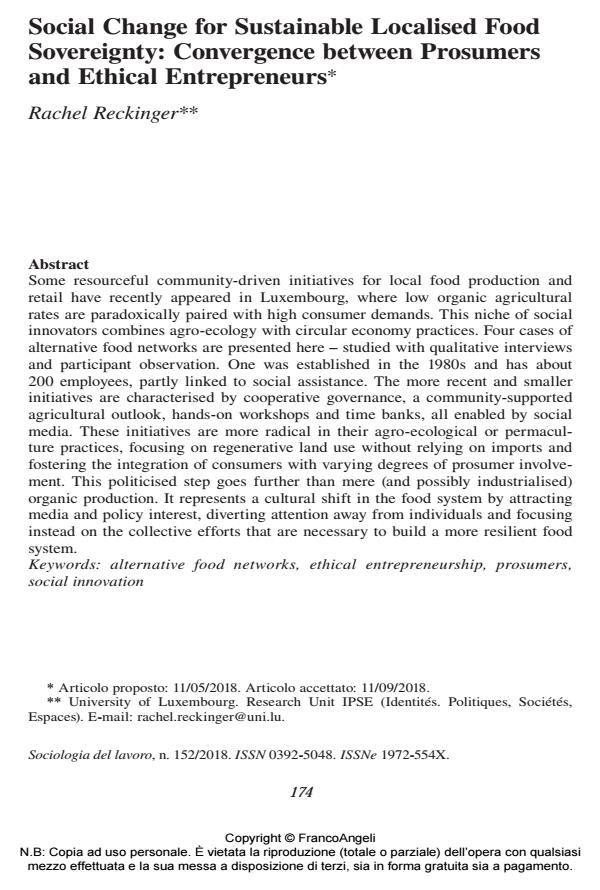Social Change for Sustainable Localised Food Sovereignty: Convergence between Prosumers and Ethical Entrepreneurs
Journal title SOCIOLOGIA DEL LAVORO
Author/s Rachel Reckinger
Publishing Year 2018 Issue 2018/152
Language English Pages 19 P. 174-192 File size 128 KB
DOI 10.3280/SL2018-152010
DOI is like a bar code for intellectual property: to have more infomation
click here
Below, you can see the article first page
If you want to buy this article in PDF format, you can do it, following the instructions to buy download credits

FrancoAngeli is member of Publishers International Linking Association, Inc (PILA), a not-for-profit association which run the CrossRef service enabling links to and from online scholarly content.
Some resourceful community-driven initiatives for local food production and retail have recently appeared in Luxembourg, where low organic agricultural rates are paradoxically paired with high consumer demands. This niche of social innovators combines agro-ecology with circular economy practices. Four cases of alternative food networks are presented here - studied with qualitative interviews and participant observation. One was established in the 1980s and has about 200 employees, partly linked to social assistance. The more recent and smaller initiatives are characterised by cooperative governance, a community-supported agricultural outlook, hands-on workshops and time banks, all enabled by social media. These initiatives are more radical in their agro-ecological or permacul¬ture practices, focusing on regenerative land use without relying on imports and fostering the integration of consumers with varying degrees of prosumer involve¬ment. This politicised step goes further than mere (and possibly industrialised) organic production. It represents a cultural shift in the food system by attracting media and policy interest, diverting attention away from individuals and focusing instead on the collective efforts that are necessary to build a more resilient food system.
Keywords: Alternative food networks, ethical entrepreneurship, prosumers, social innovation
- Social innovation as a game changer in agriculture: A literature review Ana Lucia Fernandes da Silva, Jose Antonio Plaza‐Úbeda, Roberta Souza Piao, in Sustainable Development /2024 pp.4160
DOI: 10.1002/sd.2898 - Agricultural policies and local sustainability: a normative coherence for development analysis of Mexico's pineapple sector Harlan Koff, Martha Bonilla-Moheno, Luz M. Campos-García, Swany Morteo-Montiel, Jorge Israel Portillo-Peralta, in Local Environment /2023 pp.1496
DOI: 10.1080/13549839.2023.2238739 - Innovative Entrepreneurship in Action Pasquale Del Vecchio, Valentina Ndou, Giuseppina Passiante, Demetris Vrontis, pp.129 (ISBN:978-3-030-42537-1)
- The impact of COVID-19 on alternative and local food systems and the potential for the sustainability transition: Insights from 13 countries Gusztáv Nemes, Yuna Chiffoleau, Simona Zollet, Martin Collison, Zsófia Benedek, Fedele Colantuono, Arne Dulsrud, Mariantonietta Fiore, Carolin Holtkamp, Tae-Yeon Kim, Monika Korzun, Rafael Mesa-Manzano, Rachel Reckinger, Irune Ruiz-Martínez, Kiah Smith, Norie Tamura, Maria Laura Viteri, Éva Orbán, in Sustainable Production and Consumption /2021 pp.591
DOI: 10.1016/j.spc.2021.06.022 - Drivers of the food system based on food sovereignty domains: an integrative systematic literature review Igor Rivera, Denise Díaz de León, María del Rosario Pérez-Salazar, in Frontiers in Sustainable Food Systems 1450321/2024
DOI: 10.3389/fsufs.2024.1450321 - A review of entrepreneurship and circular economy research: State of the art and future directions Nathalia Suchek, João J. Ferreira, Paula O. Fernandes, in Business Strategy and the Environment /2022 pp.2256
DOI: 10.1002/bse.3020 - L'alimentation au fil des saisons pp.195 (ISBN:978-2-86906-850-6)
Rachel Reckinger, Social Change for Sustainable Localised Food Sovereignty: Convergence between Prosumers and Ethical Entrepreneurs in "SOCIOLOGIA DEL LAVORO " 152/2018, pp 174-192, DOI: 10.3280/SL2018-152010